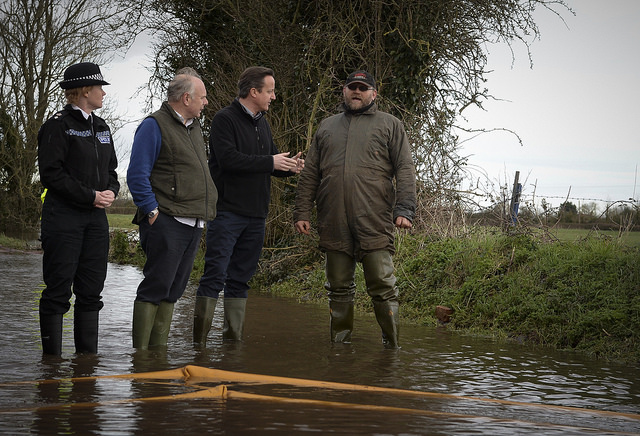You can change the political conversation. Chip in to rabble’s donation drive today!
It’s the shots of British Prime Minister David Cameron slogging through the floods there in wellies that convinced me: fatalism is back. He may have looked as if he was trying to do something, but it had nothing to do with addressing the causes of flooding. He was all accommodation: like Noah building an ark after hearing from the Lord that the skies were going to burst.
The southern U.S. is going through similar climate trauma. No sign there of attacking the problem either. It’s about hunkering down and waiting it out. Toronto’s reaction to the Christmas ice storm was equally passive. Huge numbers lost power for days: half a million people, maybe more. But little or no outrage over the service cutbacks (like pruning trees) that led to it. As if people don’t believe things could be different, so why moan?
I realize the irony of lamenting fatalism in the case of weather. It’s the realm that always seemed beyond human intervention. (Aside from rain dances or propitiating the gods.) But ours is the first era ever possessing strong evidence that human action has shaped the climate. It’s simply a case of trying to undo what we’ve (with high probability) done. If you had substantial evidence that food or water was killing your kids, you wouldn’t futz around about “the science” being inconclusive. You’d act.
I’m not talking about the tendency of governments, corporations and ideologues to lie and manipulate. I mean the propensity of populations to meekly accept brutal realities because that’s just how it is. The economy’s another example. How dared Jim Flaherty present that budget? Where did he get the balls? He ignored the state of jobs and debt in people’s lives, the way Cameron ignored climate change while wading in the water. If you went to a school meeting because kids were learning nothing and all they talked about was changing the bell schedule, there would (I sincerely hope) be fury.
The opposition senses this mood and ratifies it. The puny NDP response to Flaherty’s smug evasions was declaring an “affordability day”: to request lower ATM fees and credit card charges. They’re in lockstep with the Zeitgeist.
These things ebb and flow and there truly is a Zeitgeist, beyond all shabby efforts to create and control the “public mood.” The modern version of fatalism, a.k.a. conservatism, arose in reaction to the French Revolution. English thinker Edmund Burke was OK with the American Revolution since it didn’t try to change much, but merely shifted power into new (world) hands. The French though sought to remake reality in line with their ideals. Disaster, according to Burke, inevitably followed. For the next two centuries the subtlest argument against serious change was the “law of unintended consequences.” Then cite Stalin, Mao, Castro, etc. The noblest intentions led to the worst results. Better to do nothing than something. Or let me rephrase: never try anything, it might not work.
This is clearly an overstep. Building a heaven on earth at whatever bloody cost isn’t the same as a bit of Keynesian stimulus when times are rough for most people. Nor is doing nothing a real option. We are a species that is doomed to act. Humans can’t actually let fate take its course; that too is a decision. Over the epochs, letting fate take its course usually meant reinforcing the entitlements of the entitled. Once in a while, the outsiders took a shot and the results were indeed often dramatically dire; as opposed to the long-term incremental direness of implacably-accumulating privilege.
Victor Serge had a good sense of this: a Russian writer/revolutionary who was imprisoned and exiled by all sides at various times. Near the end, in 1943, after recounting all the disastrous, unintended consequences he’d both suffered and been partly responsible for, he wrote: “And to think that it is not over yet. Let me be done with this digression. Those were the only roads possible for us. I have more confidence in mankind and the future than ever before.”
It’s a matter of timing really. It’s right to be cautious about action but wrong to be cowed. We could use an injection of his kick-ass anti-fatalism now.
This article was first published in the Toronto Star.
Like this article? Chip in to keep stories like these coming!
Photo: Number 10/flickr



